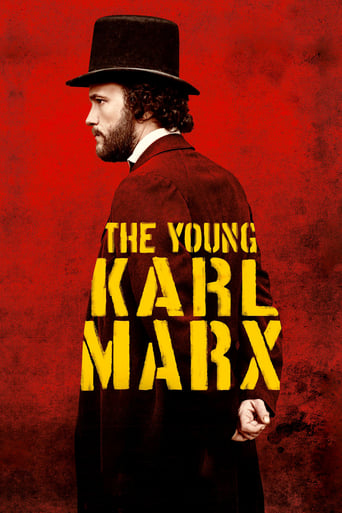jmsdxtr-215-978064
When an honest film like this gets 6.5 stars on IMDB and The Avengers: Infinity Wars get 9.1, it shows that there is something terribly wrong with the ranking system on this site. A thinking film that captures the emotional, social and political complexity of mid-nineteenth industrial European radicalism is something to be truly cherished in this age of the vomit and mind numbing putridity coming from the nightmare factory of popular culture. That's all I need to say. Just watch this film.
victoriavaradi-47267
I don't think that the film was terrible. It had decent cinematography, music, acting. I really enjoyed listening to so many different languages in the same film. It is watchable once, especially if somebody is interested in this topic and period of history. But I think it lacked any artistic vision or imagination, depth, or entertainment. I don't know if it was because the filmmakers wanted to stay very true to the historical facts (which would be understandable), but watching the film felt a little bit like listening to a very basic two-hour lecture about Marx and his work. The plot fell quite flat, without twists, without changes or even a real climax. (I guess Engels' speech in the end was supposed to be the climax of the film, but I only came to that conclusion after thinking about it for a while, since it didn't have too much emotional impact.) In the beginning, Marx works on articles and talks about his theories, after he meets Engels, they work on articles and talk about their theories with each other and others, finally, in the end, they still write articles, and talk about theories. So basically they do the same things and talk about the same things. Marx is having financial problems and has a loving wife, Engels doesn't have financial problems, and has a supporting girlfriend/wife throughout the whole movie. So their circumstances, their private lives do not change too much either. It is great for them, but not so great for the viewers. (Although I am sure that in reality they had quite a bit of drama in their lives, like Engels going against his father, their marriages, the effects of the financial problems, the eviction from France etc.) The glimpse we get into their private lives in a way feels too much, since it is portrayed in a rather uninteresting way, but it's too few to get to know them on a more "personal" level. It still feels like we see two characters who just walked out of the pages of a history book, as opposed to real living people with complex lives and feelings. If you want to know more about Marx, as a young guy, as a person I think this film doesn't do the job. If you want to know more about his work, or this part of history, you are better off reading a book, if you want to be entertained, than maybe it's also not the film for you. From a different point of view, for a commercial film, it's not really entertaining enough, for an art film, it doesn't have a point of view, and as a biographical film, it's probably not detailed enough.
rudigerkleinmanagement
This is a beautifully presented historical drama – and a political story/argument. It's based on the letters exchanged between Marx (August Diehl) and Friedrich Engels (Stefan Konarske). The film follows their friendship from their first meeting all the way until the the drafting of the Communist Manifesto. The story illuminates their arguments, their friendship, and their personal histories.Marx, played by August Diehl, in an angry way, impoverished, and looking for an argument. Engels, played by Stefan Konarske, is the wealthy fellow, a dandy and a romantic.The problem is, watching people argue about communist theories reminds me of my college days, minus the joint. It can be tedious, especially given the failure of communism. Nevertheless it's interesting if you're into politics and history. In fact it's a perfect film to show in a university course on social studies because it is, I believe, historically accurate. I would love to see someone take these characters and plop them down in present day to reflect on the course their ideas have taken. THAT would be a great talking film.
Indie Cinema Magazine
The Young Karl Marx chronicles the period when young Karl Marx meets his future long-term friend and co-author Friedrich Engels and the several following years. During the Berlinale press conference dedicated to the film Raoul Peck was asked if he read Karl Marx. He answered that he attended seminars dedicated to Marx's Capital. His film is reminiscent of such a seminar; interminable and tedious.There are many dialogues, questions, answers however the film completely lacks artistic vision. There is no interesting music, camera-work or a gripping plot.Raoul Peck tried to underline the more materialistic side of his relationship with Jenny, showing his sex life and child birth. To deprive Marx of certain romanticism is also not fair, the young philosopher was a romantic of his own kind; he was engaged for seven years to Jenny and dedicated many poems to her.The discussions depicted in the film are too primitive for such great thinkers such as Marx, Engels, Proudhon and Bakunin. The proletariat, on the other hand, is shown as a group of people with abject faces and feeble children, which makes the ideas of Marx about the proletariat too idealistic and not connected to reality.One of the positive sides of the picture is that Peck did not try to distort facts about the people in the film, however after the film finishes one feels relieved that the drawn-out seminar on Karl Marx is finally over.Read more at: http://indie-cinema.com/2017/02/young-karl-marx/



